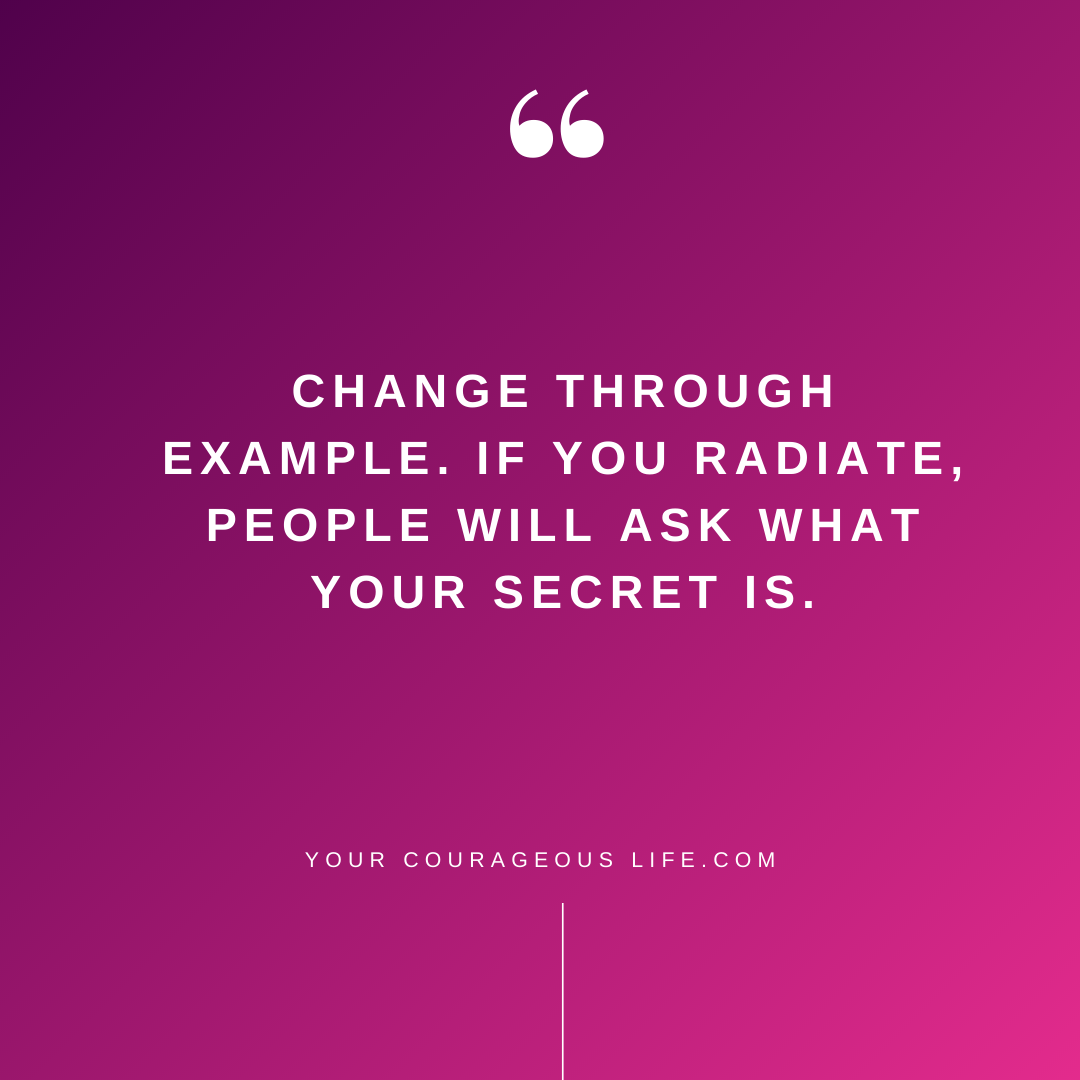Change through example
We do not change people’s behavior through criticism. If you really want to change someone’s behavior, change through example. (May this save you some time if you’re ever trying to change someone’s behavior by criticizing them on the internet. No one looks at a condescending social media post that insults their perspective and thinks, “Gee, I know, I’ll be different.”)
But more often than not, when we think we’re going to change someone’s behavior by criticizing, or bringing up all the worst possible outcomes, or telling someone what they should do, we’re not thinking that we’re being mean. We’re thinking, “I’m just trying to help, because I just want what’s best for her/him.”
Hit the pause button on that one.
Take time to ask yourself: Do I really want what’s best for her/him? Or do I want what’s best for me?
For instance, let’s say that someone thinks, “Billy Bob shouldn’t quit his job to start his own business–the economy is in such bad shape! I’m only telling him that because it’s what’s best for him.”
(Maybe you are an entrepreneur or a budding coach. Maybe people are telling you these things).
Let’s assume in the above example that Billy Bob (or you!) has communicated clearly that he is fully behind his decision, and that the person making that kind of statement is not sharing any new information–Billy Bob is smart and capable, and he already knows that the economy isn’t great and already knows that starting his own entrepreneurial shenanigans will be a real challenge.
Consider then that the speaker, in this case, is not speaking to what is best for Billy Bob. They’re speaking to what’s best for them.
It’s best for them not to quit their job in this economy. It’s best for them not to feel the discomfort of Billy Bob make choices that are at odds with their own choices.
“Sally Sue shouldn’t be eating XYZ; I’m only trying to tell her what’s best for her so that she doesn’t get cancer or some other terrible disease. I’m only trying to educate people; people just don’t know what they’re doing to their bodies.”
Bzzzzzzzzttt! No.
Unless Sally Sue has signed up with this person for a consultation, or asked for advice about integrating a particular diet into her own lifestyle, the speaker is speaking to what’s best for them, not what’s best for Sally Sue.
Change Through Example
Here’s my observation: Most people, most of the time, genuinely want to make the “right” choices. They want to eat the “right” things, and do the “right” work, and communicate in the “right” ways. They genuinely desire answers that meet real challenges.
Here’s another: Nine times out of ten, what convinces someone to make a change in their lives is not someone else telling them what’s “right,” so much as it is seeing something within others that is so attractive and magnetic that they say, as did the fellow diner during the best scene ever in the movie When Harry Met Sally: “I’ll have what she’s having.”
If you genuinely believe in your cause, whether it’s a lifestyle change or a new business venture or even a spiritual perspective, try something out:
-don’t bring up the things that could go wrong
- or the logical arguments for why you’re so right,
- or the condescension that others are such “sheep” who can’t see “the truth” and implying that anyone who doesn’t agree is just bleating their way through life…
…try living life your own life fully, because if you do, you’ll radiate. Change through example. If you radiate, people will ask what your secret is.
Not only does change through example mean that the energy is going where it needs to go–you! your life!–it also means that instead of begging for people to see why they should change, begging people to join you for your cause, begging people to be different than they are… people are likely to be asking you left and right how they can “have what you’re having.”
Then you can tell them, and let them decide. (Trying to convince the dubious only dulls your radiance).
Feeling Dull?
This is also an excellent strategy when you’re not feeling so radiant, and you’re wondering why everything around you seems to be in a slump.
See it with new eyes.
Remember what it was like when you first started.
Adopt “Beginner’s Mind,” the Buddhist perspective for seeing things fresh, new, untested.
By all means–admit the truth when it sucks rather than trying to put a pretty patina over everything–while being willing to reach, stretch beyond that.
What’s Best For You?
Enthusiasm, passion, and being fully behind what you believe in are magnetic–no, they’re beyond magnetic, they’re irresistible.
If you really believe in your great advice or your cause and its potential to help others, and you want to get more people on board, you know what you need to do:
Start with doing what’s best for you.

